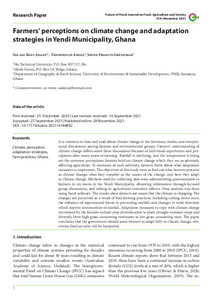Farmers' perceptions on climate change and adaptation strategies in Yendi Municipality, Ghana
| dc.date.accessioned | 2022-01-11T11:30:13Z | |
| dc.date.available | 2022-01-11T11:30:13Z | |
| dc.date.issued | 2021-11-29 | |
| dc.identifier | doi:10.17170/kobra-202110144892 | |
| dc.identifier.uri | http://hdl.handle.net/123456789/13502 | |
| dc.language.iso | eng | eng |
| dc.rights | Namensnennung 4.0 International | * |
| dc.rights.uri | http://creativecommons.org/licenses/by/4.0/ | * |
| dc.subject | climate change | eng |
| dc.subject | perception | eng |
| dc.subject | adaptation strategies | eng |
| dc.subject | farm practices | eng |
| dc.subject | diversification | eng |
| dc.subject | strategies | eng |
| dc.subject | Ghana | eng |
| dc.subject.ddc | 630 | |
| dc.title | Farmers' perceptions on climate change and adaptation strategies in Yendi Municipality, Ghana | eng |
| dc.type | Aufsatz | |
| dcterms.abstract | It is common to hear and read about climate change in literature, media and interpersonal discussions among farmers and environmental groups. Farmers understanding of climate change differ in the midst of these discussions because of individual experiences and perceptions after many years of farming. The rainfall is declining and the temperature is rising are the common perceptions farmers hold on climate change which they see as adversely affecting agriculture. In moments of such adversity, farmers think about what adaptation measures to implement or are already implementing. The objectives of this study were to find out what farmers perceive as climate change, what they consider as the causes of the change and how they adapt to climate change. Research questions investigated were what are farmers’ perceptions on climate change? What do farmers consider as the causes of climate change? And how do farmers adapt to climate change? Methods used for collecting data were administering of questionnaires to farmers in six towns in the Yendi Municipality, obtaining information through focused group discussions and talking to agricultural extension officers. Data analysis was done using the excel software and the results shown in tables, graphs and charts. Study results showed farmers acknowledged that the climate is changing, and the changes are as a result of bad farming practices including cutting down of trees, influence of super natural forces in preventing rainfall, and changes in wind direction which deprive communities of rainfall. Adaptation measures to cope with climate change mentioned by the farmers include, crop diversification with the view to plant drought resistant crops, and diversifying from high grass consuming ruminants to low grass consuming ones. | eng |
| dcterms.accessRights | open access | |
| dcterms.creator | Adanu, Selase Kofi | |
| dcterms.creator | Abole, Theophilus | |
| dcterms.creator | Gbedemah, Shine Francis | |
| dc.subject.swd | Ghana | ger |
| dc.subject.swd | Klimaänderung | ger |
| dc.subject.swd | Wahrnehmung | ger |
| dc.subject.swd | Anpassung | ger |
| dc.subject.swd | Landwirtschaft | ger |
| dc.subject.swd | Vielfalt | ger |
| dc.subject.swd | Strategie | ger |
| dc.type.version | publishedVersion | |
| dcterms.source.identifier | eissn:2197-411X | |
| dcterms.source.issue | No. 4 | |
| dcterms.source.journal | Future of Food: Journal on Food, Agriculture & Society | eng |
| dcterms.source.volume | Vol. 9 | |
| kup.iskup | false | |
| dcterms.source.articlenumber | 419 |


